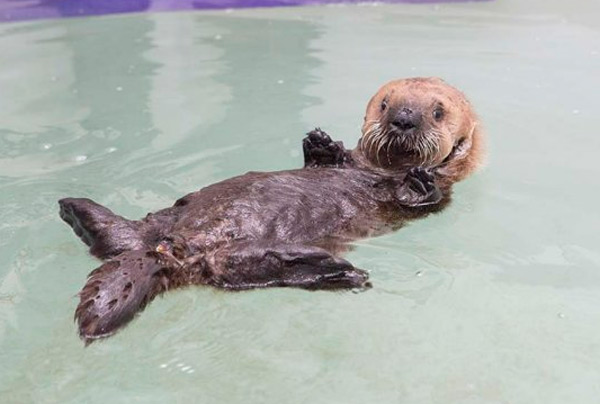Help the Shedd Aquarium name their famous sea otter pup

The Shedd Aquarium’s rescued California sea otter pup 681 needs a name, and Good Morning America is helping the aquarium to raise awareness and choose a name between five options. You can vote for a winning name in the poll here.
Press Release:
CHICAGO – Shedd Aquarium’s rescued southern sea otter pup (Enhydra lutris nereis) – currently known as Pup 681 – has been swimming past significant milestones over the last few weeks and is growing quickly. Already double in size and weighing in at a little over 10 pounds, Pup 681 is now ready for a name. As a global leader in aquatic conservation, environmental education and animal care, Shedd is partnering up with ABC’s Good Morning America to name the female sea otter pup – who came to the aquarium as part of a collaborative partnership with Monterey Bay Aquarium on Oct. 28 – through the “Name the Sea Otter Pup” voting contest.
“The entire organization celebrates Pup 681 as a meaningful way to educate our guests and have a better understanding of sea otters – which is critical to conserve and protect this species,” said Tim Binder, Vice President of Animal Collections for Shedd. “Over the past few weeks, she has won the hearts of many in Chicago and across the nation. We’re excited to team up with a national organization, to connect millions of people with this species inspiring conservation for wildlife and the environment through the engaging process of selecting a name for our sea otter with everyone.”
GMA invites viewers to get involved with the contest by casting their votes online at on GoodMorningAmerica.com on Yahoo starting Tuesday, Dec. 2 at 8 a.m. EST. Participants can submit votes as often as they like until Thursday, Dec.11 at 3 p.m. EST. The final name will be revealed on Friday, Dec. 12.
The public will choose from five names selected by Shedd’s marine mammal staff. Shedd has a history of naming animals that are rescued affiliated with the locations of which they were found. Names include:
· Cali - To honor the California otter · Ellie - Año Nuevo State Park is well known for its elephant seals, also Elkhorn Slough - an area that is right up the coast from Monterey that is home to many sea otters · Luna - Derived from nearby Half Moon Bay · Poppy - California State Flower · Aña or Anya - Derived from Año Nuevo State Park Shedd Aquarium members were offered an exclusive first look at the name choices and the first chance to vote. The winning “Shedd Members’ Choice” is Luna and will be highlighted in the public vote on GoodMorningAmerica.com on Yahoo.
With a long history of involvement with marine wildlife rescue projects, Shedd Aquarium is one of the first institutions to conduct training with sea otters to further their survival and care. After the Exxon Valdez oil spill in 1989, Shedd participated in the wildlife recovery efforts and took in many orphaned pups. The aquarium is now recognized as an expert in rehabilitating sea otter pups. Nearly all of the sea otters residing in the Abbott Oceanarium at Shedd were rescued pups – three northern and two southern subspecies, including Pup 681.
About Sea Otters As the smallest marine mammal, sea otters are members of the weasel or mustelid family. Adult females can weigh between 35 and 60 pounds; males reach up to 90 pounds. Instead of blubber to keep them warm, they have very thick hair that consists of two layers: an undercoat and longer guard hairs. The otter’s fur is important to their survival, so they spend up to four hours a day grooming. If they do not keep their coat immaculate, they risk getting cold and dying of hypothermia.
Pups stay with their mothers until they are up to eight months old. Otters do not mate for life, but form a bond that lasts for three or four days. After mating, the male leaves the female and is not involved in raising the pup. Sea otters must eat at least 25 percent of their body weight each day to maintain a high metabolic rate, which keeps their internal body temperature at 100°F. They eat bottom-dwelling nearshore animals, such as abalone, clams, sea urchins, crabs and octopus.